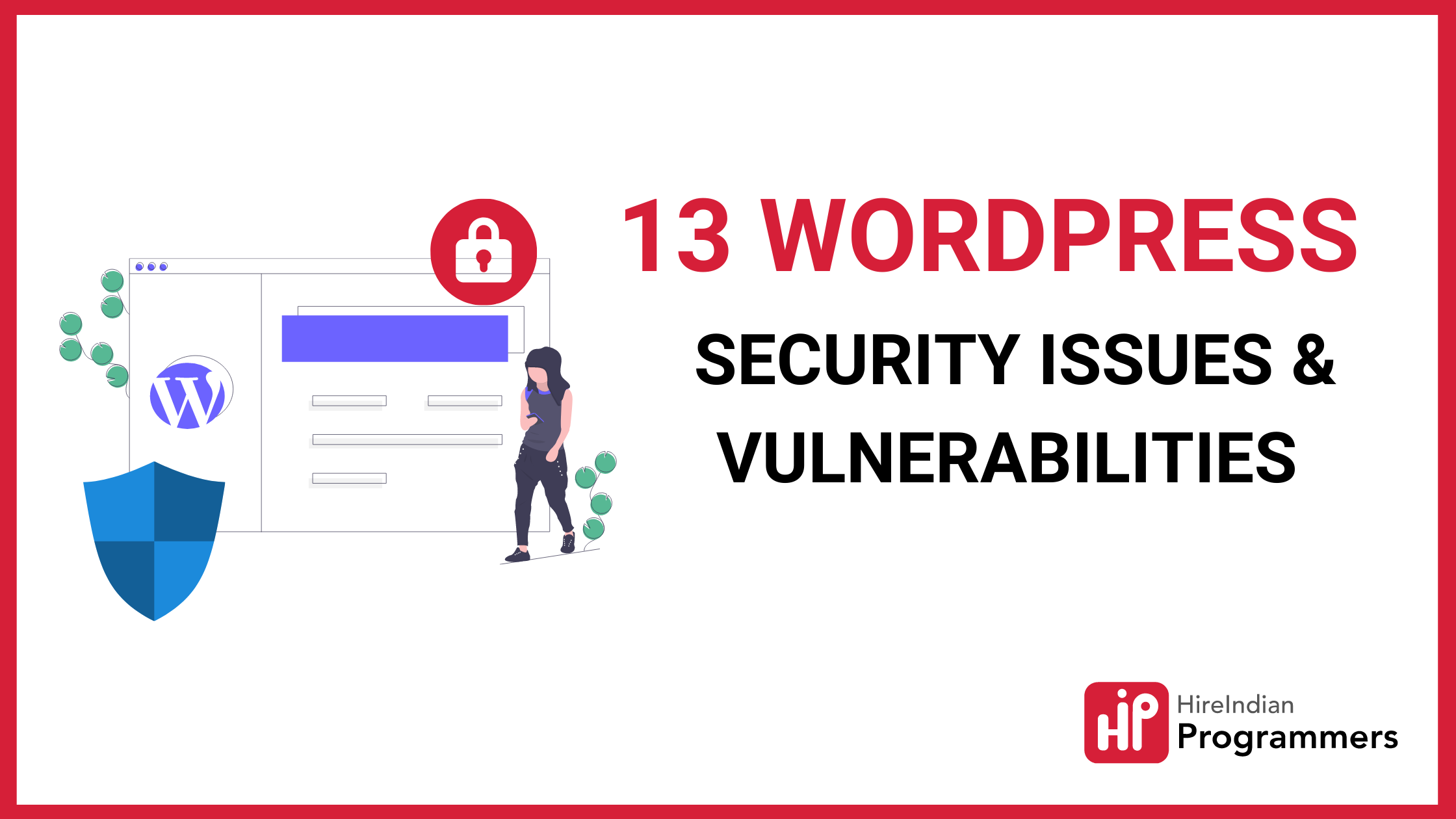WordPress has made the process of developing a website quite easy for the mass. At present, this popular CMS has been questioned on its security issues and how they are planning to deal with them.
According to a report, in 2020 Wordfence had declared 2,800 attacks per second on WordPress.
Among 2 billion websites, only 45% are powered by WordPress because, at present, it has been subjected to so many attacks. Thus, to minimize WordPress security issues and vulnerabilities, they are trying hard to evolve into a much more secure system.
13 WordPress Security Issues & Vulnerabilities
Cyber attacks are a waste of resources like time, energy, and money but it is impossible to quantify day-to-day threats to a site that has been subjected.
Plus, it can even disdain your reputation and threaten your authority most adversely. Thus, 13 WordPress security issues and vulnerabilities can be listed as:
1. Unauthorized/ Unethical access
The process of unauthorized login is like a traditional cracking the coding process done to gain unethical access to your computer. The attackers generally perform these operations through a bot and quickly run through billions of user password combinations.
WordPress sites can be vulnerable to these attackers for two reasons:
- Anyone may reach the login page by taking the site’s main URL and appending /wp-admin or /wp-login.php to the end easily.
- Attackers can obtain access quickly by using the default “admin” account and a basic, popular password.
2. Doubtful user roles
When you establish a WordPress site, you may select from six distinct user roles, such as Subscriber or Administrator and there each role includes native rights that enable or disable users from performing specific tasks on your site, such as changing plugins, uploading content, and others and this pose a threat to WordPress sites.
If brute-force assaults are successful, poorly defined admin roles expose your site to additional danger, as admin roles can allow a hacker entire access to your site making it extremely vulnerable.
3. The outdated and old core software
WordPress developers fail to enhance the functionality and security of the platform for their users. The reason behind it is that the developers release updates roughly every three months.
It is strongly advised that all WordPress users download these updates as soon as they become available as this does not happen automatically.
4. Multiple outdated Themes/Plugins
Numerous types of themes and plugins are created by developers for WordPress site owners to utilize and modify their sites but this requires the site owners to take appropriate security measures.
Both outdated software and themes/plugins are susceptible to risks and attacks and it requires proper security measures.
5. Malware attack
Malware is a wide word that encompasses any harmful software. To steal from websites and their users, hackers might insert malware files inside genuine website files or insert code into existing files.
Moreover, the virus might also use “backdoor” files to try illegal logins or cause widespread chaos. Malware typically infiltrates WordPress sites via illegal and outdated themes and plugins.
Hackers exploit security flaws in plugins and themes, replicate existing ones, and even develop new add-ons for the sole goal of injecting malicious code into your website.
6. Improper usage of Structured Query Language (SQL)
SQL is a computer language designed to easily retrieve data stored on a given website. It is the recommended language for database management on WordPress.
During a SQL injection, a hacker has direct access to and modification of your website’s database. SQL may be used by attackers to create new accounts on your site, add illegal links and content, and leak, change and delete data.
WordPress sites are vulnerable to this sort of attack since most are designed to generate a sense of community. SQL injections are widely used by attackers in visitor-facing submission forms such as contact forms, payment info fields, and lead forms.
7. Spamming of Search Engine Optimization (SEO)
Hackers exploit your top-ranking pages by stuffing them with spammy keywords and pop-up advertising.
WordPress sites are vulnerable to these cyberattacks in the same way these multiple outdated plugins, themes, and the core software are.
As WordPress is SEO-based, these spammy keyword additions are exclusively placed on your high-ranking pages and then they get undetected during a site-wide assessment.
8. Occurrence of Cross-Site Scripting
Cross-Site Scripting (XSS) occurs when an attacker inserts malicious code into the website’s backend code.
Once attackers get access to your front-end display, they may attempt to damage visitors by, for example, providing a disguised link to a malfunctioning website or showing a bogus contact form to steal user information.
9. Increase in Denial of Service (DOS) Attacks
Denial of Service Attacks (DOS) generally block site administrators and visitors from accessing a website and they go about this by sending innumerable traffic to a target service and pushing them to take out all the websites from it.
WordPress requires hosting and their DoS and DDoS tend to attack such WordPress hosting and put a threat to its security.
10. Introduction of Phishing
Phishing is a process where hackers send out a truckload of spammy links and if one user accidentally clicks on it, then your privacy and information get compromised. Here, WordPress gets mostly targeted.
11. Unnecessary hotlinking
Hotlinking occurs when anyone uses anyone’s work without permission. Other websites can take advantage of it by embedding content, images, and others from your website.
Hotlinking cannot be termed as direct spamming because those who practice hotlinking are not professional hackers but have poor internet handles.
WordPress is vulnerable to hotlinking because here users tend to copy/paste a link of an image or a digital file on the site without giving any proper credit and preventive measures are not available to stop this.
12. Numerous Supply Chain attacks
The supply chain mostly attacks themes and plugins of WordPress’s themes and plugins, how? There are two ways for such attacks:
- Plugin owners can install malware on customer’s site
- Hackers can purchase popular plugins and enable spammy code
13. Cross-site Request Forgery (CSRF)
Cross-site Request Forgery (CSRF) is regarded as a vulnerability, allowing attackers to influence and encourage users to take necessary actions.
Plugins of WordPress like check_url(), and WP Fastest Cache are vulnerable to such attacks.
5 Reasons Behind The Popularity of WordPress
Mike Little and Matt Mullenweg introduced a blogging tool known as B2/catalog in 2003. This superb logging platform is erected on the original B2 code base equipped with more robust features and later on it is named WordPress.
Since then, it gained popularity and got recognized as the most versatile and user-friendly CMS platform which can be accessed by all.
5 reasons behind the popularity of WordPress :
- WordPress is free and open-source software that makes it easy for users to find, use, edit and redistribute.
- WordPress plugins make the operation simple and autonomous, keeping a low budget maintenance cost.
- WordPress is equipped with a gamut of themes with pre-populated content and images and this feature makes it quite lucrative for users.
- WordPress provides a logically arranged menu of options and multiple mouse-click selections.
- WordPress is a versatile platform which holds a rating of 99% SEO-friendly approach and due to its well-designed structure optimization can be done quite easily.
How to fix WordPress security issues?
If your website is cited as vulnerable and requires immediate attention, then you can go for some preventive measures to anticipate future attacks.
- Give priority to maintaining an effective backup routine.
- Maintain a regular backup of your database to ensure a quick and easy return service.
- Perform a complete overhaul of the unattended issues on your website.
- Redesign your site to prevent WordPress Security vulnerabilities.
- Keep an update on your technologies daily.
- Hire a WordPress developer to keep your website up-to-date and take care of all the above-mentioned tasks to make your website secure.
Thus, these above-stated measures can be an effective step toward preventing your WordPress security issues and increasing the ranking of your website.
Some facts to note on WordPress Security
According to WordPress statistics 2020, WordPress is acclaimed as one of the leading content management systems which power over 34% of the websites currently ruling the internet. So, some of the noted facts of WordPress can be enlisted as:
- WordPress security mostly depends on the admin and not on the CMS.
- Single programs like Bot developed by attackers mostly creep into the WordPress website and create trouble.
- Hacking and black hat SEO are sometimes used by attackers to reroute visitors to their illegal or spammy domain.
- Limiting login attempts in WordPress can discourage brute-force on your website.
- It is better to change the WordPress URL and default username to increase your security.
Taking care of your WordPress website by securing it from threats and vulnerabilities is not a tough task if the user can handle it cautiously in an organized manner.
FAQs you might have before or after reading this blog on WordPress security:
1. Does WordPress have good security?
WordPress is secure as long as web hosts take website security seriously and adhere to recommended practices.
2. What are the vulnerabilities of WordPress?
The list of vulnerabilities and security issues of WordPress are:
- Brute Force Attack.
- SQL Injection.
- Malware.
- Cross-Site Scripting.
- DDoS Attack.
- Old WordPress and PHP versions.
3. Is WordPress easily hacked?
Hacking efforts may be made on every website on the internet. WordPress sites are a popular target since WordPress is the world’s most popular website builder. It powers roughly 31% of all websites, which translates to hundreds of millions of web pages worldwide.
4. What percentage of WordPress sites are hacked?
According to statistics, 8 percent of WordPress websites are hacked owing to weak passwords.
5. Why is WordPress not secure?
Google declares your WordPress website insecure because it lacks an SSL certificate or has an SSL certificate that is improperly set.
6. How often does WordPress get hacked?
Many websites are hacked without the awareness of the site owners or management. According to WordPress hacking statistics, an attack occurs every 39 seconds on the web on average, however, an assault does not automatically indicate a hacked website.
7. What are some of the potential security risks of using a CMS like WordPress?
Updates are one of the most serious hazards linked with CMS. CMS change at a quick pace, thus updates must be done frequently. Furthermore, new vulnerabilities are discovered and corrected regularly, which is why it is critical to install updates as soon as possible and to check the available patches regularly.
8. Why is WordPress security important?
A hacked WordPress site can seriously harm your company’s income and reputation. Hackers can steal user information, and passwords, install dangerous software, and even disseminate malware to your users.
9. Is WordPress safe for ECommerce?
WordPress is a secure platform for your eCommerce website as long as you have adequate security measures in place. Millions of ECommerce sites cannot continue to operate on a dangerous platform.
10. What is the latest version of WordPress?
The most recent WordPress version is 5.6 “Simone,” which was released on December 8th, 2020.

